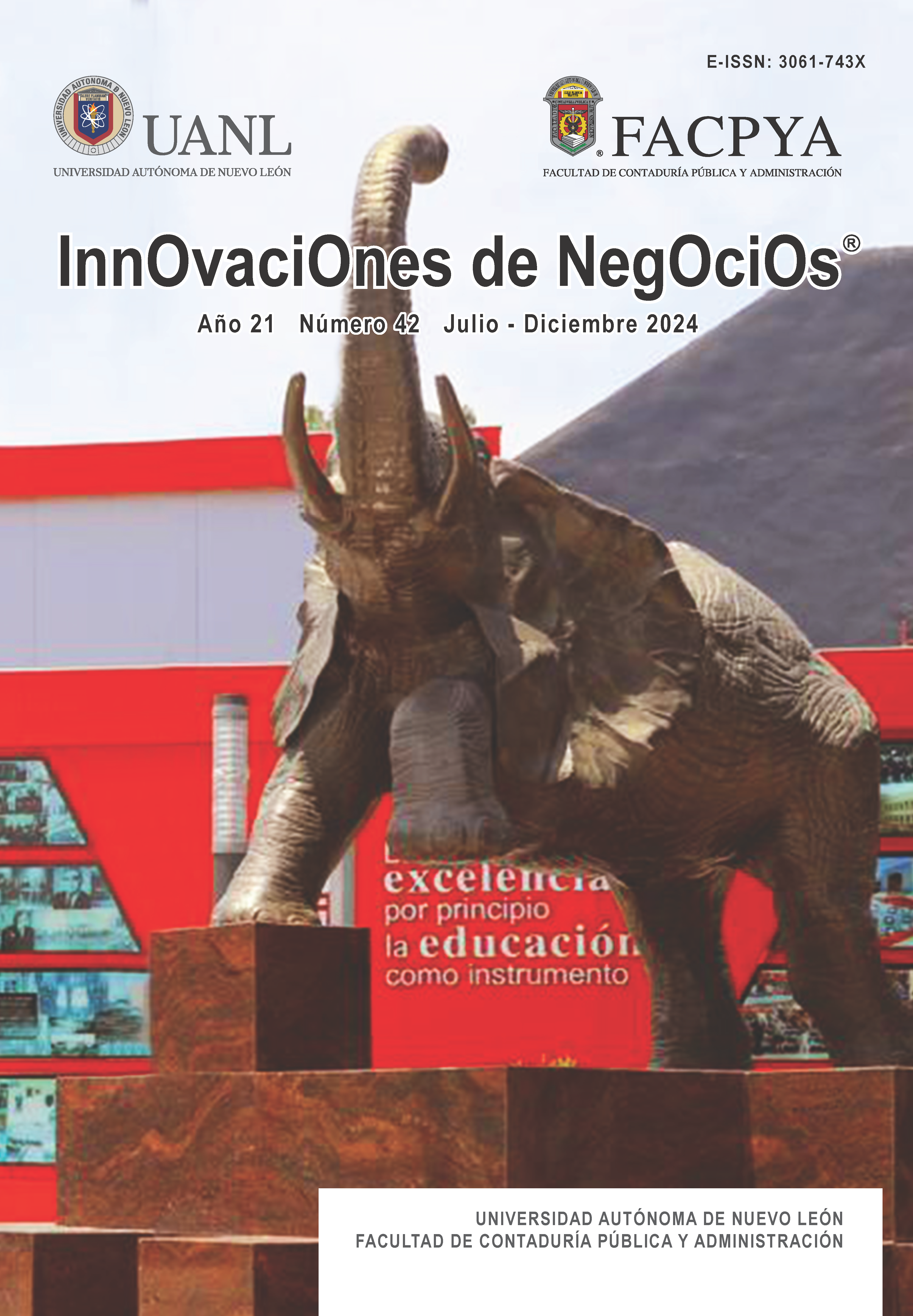Digital Buying Behavior Tourism, a Bibliometric Exploration from Dimensions
DOI:
https://doi.org/10.29105/revin21.42-453Keywords:
bibliometric analysis, digital purchasing behavior, online consumerAbstract
The customer is accustomed to transacting with a physical reference for their purchase (Manss, 2020), so not having this in digital transactions creates a degree of complexity in ensuring trust towards digital purchasing. The buying of tourist trips has seen a significant boom, thanks to the increase in digital transactions. This work highlights the objective of analyzing from a bibliometric analysis perspective the information that exists about topics of digital purchasing behavior, since it is a theme that has grown significantly because of the COVID-19 pandemic. The analysis was based on a quantitative methodological approach, through the collection of data from Dimensions and processed using VOSviewer software to obtain the main findings. Research that emerged in the last 10 years, keywords, themes, as well as the main authors who have written about these variables were highlighted. It emphasizes the gap to inquire more about behavior from the perspective of social sciences as they present relevant studies from the technological viewpoint, still lacking more articles in Latin America.
Downloads
References
Alberca Sialer, F. A. (2020). Sobre los estudios bibliométricos en turismo. Cultura: Revista de la Asociación de Docentes de la USMP, 34. 125-143. https://doi.org/10.24265/cultura.2020.v34.09 DOI: https://doi.org/10.24265/cultura.2020.v34.09
AMVO (2023, February 3). Estudio sobre Venta Online en México – 2022.Www.amvo.org.mx. https://www.amvo.org.mx/estudios/estudio-sobre-venta-online-en-mexico-2022/
Belter, C. (2015). Bibliometric indicators: opportunities and limits. Journal of the Medical Library Association: JMLA, 103 (4), 219-221. https://doi.org/10.3163/1536-5050.103.4.014 DOI: https://doi.org/10.3163/1536-5050.103.4.014
Chamboko-Mpotaringa, M., & Tichaawa, T. M. (2023). Domestic tourists'perceptions of the intention to use digital marketing tools and platforms. Geo Journal of Tourism and Geosites, 46(1), 9-18. https://doi.org/10.30892/gtg.46101-995 DOI: https://doi.org/10.30892/gtg.46101-995
Chaparro Pinzón, C. R. (2022). Factores determinantes para la intención de compras en línea para los consumidores boyacenses. Revista Universidad & Empresa, 24(43), 1-36. https://doi.org/10.12804/revistas.urosario.edu.co/empresa/a.11934 DOI: https://doi.org/10.12804/revistas.urosario.edu.co/empresa/a.11934
Galardi Boza, M. (2020). El comercio electrónico. Evolución y COVID-19. [Tesis de pregrado, nombre de institución, Universidad de Sevilla]. https://idus.us.es/bitstream/handle/11441/103564/1/GALARDI_BOZA_M%28161%29.pdf?sequence=1
Hernández, S. D. R. P. (2020). La fidelización del cliente y retención del cliente: Tendencia que se exige hoy en día. Gestión en el tercer milenio, 23(45), 5-13. https://doi.org/10.15381/gtm.v23i45.18935 DOI: https://doi.org/10.15381/gtm.v23i45.18935
Jara Chalán, M. J., Olivera Orihuela, M. V., & Yerrén Huiman, E. J. (2018). Teoría de la personalidad según Albert Bandura. Revista De Investigación De Estudiantes De Psicología “JANG”, 7(2), 22–35. En: https://revistas.ucv.edu.pe/index.php/jang/article/view/1510
Li, X., Liang, X., Yu, T., Ruan, S., & Fan, R. (2022). Research on the integration of cultural tourism industry driven by digital economy in the context of COVID-19—based on the data of 31 Chinese provinces. Frontiers in Public Health, 10, 780476. https://doi.org/10.3389/fpubh.2022.780476 DOI: https://doi.org/10.3389/fpubh.2022.780476
López-Piñón, D. C., Terán-Cazares, M. M. (2020). Análisis de los factores que influyen en la intención de compra online. VinculaTégica, 6(2), 1377 - 1385. https://doi.org/10.29105/vtga6.2-603 DOI: https://doi.org/10.29105/vtga6.2-603
Manss, R., Kurze, K., y Bornschein, R. (2020). What drives competitive webrooming? The roles of channel and retailer aspects. The International Review of Retail, Distribution and Consumer Research, 30, 233 - 265. https://doi.org/10.1080/09593969.2019.1687104 DOI: https://doi.org/10.1080/09593969.2019.1687104
Manyoma, C. P., & García, M. E. A. (2019). Marcas privadas: Relevancia e incidencia en el comportamiento del consumidor. Revista Académica ECO, 20, 23-38. http://revistasguatemala.usac.edu.gt/index.php/race/article/view/1059
Marketing zone icesi. (2021, 22 junio). Importancia del marketing farmacéutico en un mundo cada vez más digital. Marketing zone. https://www.icesi.edu.co/marketingzone/importancia-del-marketing-farmaceutico-en-un-mundo-cada-vez-mas-digital/
Molina, D. L. P., Andrade, J. E. P., Cedeño, V. J. S., & Olives, G. S. (2020). Las nuevas tendencias de la mercadotecnia y su influencia en el comportamiento de compra del consumidor de Manta-Ecuador. Observatorio de la Economía Latinoamericana, 18(7). https://ojs.observatoriolatinoamericano.com/ojs/index.php/olel/article/download/87/80
Pico Bonilla, C. M. (2021). La teoría económica y el modelo de perspectiva conductual: una aproximación experimental al efecto de los ingresos y precios sobre la elección del consumidor [Doctoral dissertation, Universidad Nacional de Colombia]. https://repositorio.unal.edu.co/handle/unal/80026
Rodrigues, P. R. G. (2018). Influência social, minorias ativas e desenvolvimento moral: Ensaio teórico sobre a representatividade de política brasileira. Psicología & Sociedad, 30, 1-10. https://doi.org/10.1590/1807-0310/2018v30173402 DOI: https://doi.org/10.1590/1807-0310/2018v30173402
Sukno, R. & Pacual I. (2019). E-Commerce C2C en Chile: Incorporación de La Reputación y de la Confianza en El TAM. Journal of technology management & innovation, 14(3), 72-81. http://dx.doi.org/10.4067/S0718-27242019000300072 DOI: https://doi.org/10.4067/S0718-27242019000300072
Venkatesh, V., Morris, M., Davis, G., & Davis, F.D. (2003). User Acceptance of Information Technology: Toward a Unified View. MIS Quarterly, 27(3), 425-478. https://doi.org/10.2307/30036540 DOI: https://doi.org/10.2307/30036540
Venkatesh, V., Thong, J. & Xu, X. (2012) Consumer Acceptance and Use of Information Technology: Extending the Unified Theory of Acceptance and Use of Technology. MIS Quarterly 36(1), 157-178. https://doi.org/10.2307/41410412 DOI: https://doi.org/10.2307/41410412
Downloads
Published
How to Cite
Issue
Section
License
Copyright (c) 2024 Omar Antonio Muñoz Cardona, María Mayela Terán Cazares, María de Jesus Araiza Vazquez

This work is licensed under a Creative Commons Attribution-NonCommercial-ShareAlike 4.0 International License.
The InnOvaciOnes de NegOciOs magazine is a free and open access electronic magazine of a scientific-academic nature and is a publication of the Autonomous University of Nuevo León, in which the authors retain their copyright and grant the magazine the exclusive right to first publication of the work. Third parties are allowed to use the published content, as long as the authorship of the work is acknowledged and the first publication in this journal is cited.
For more information, please contact the Research Secretary (FACPyA) of the Autonomous University of Nuevo León. Telephone: (81) 1340-4430. Email: revinnova@uanl.mx










